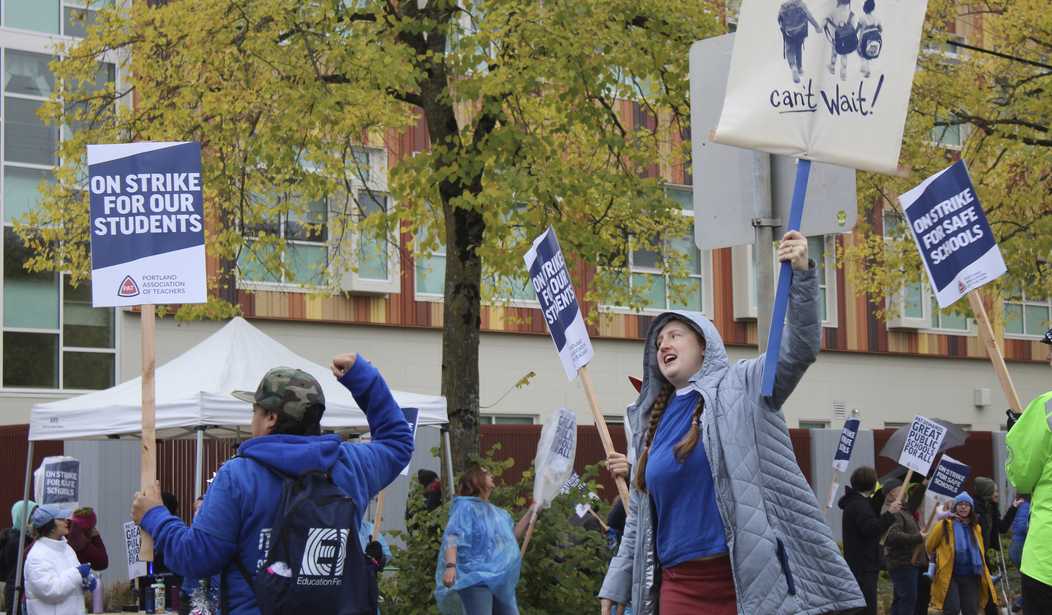First Portland. Next, Salem-Keizer came close. Then Albany. And the rumblings of a possible teacher strike in Beaverton continue.
Whether you feel they’re justified or not, school-shuttering strikes shouldn’t be the norm. Teacher walkouts are illegal in most states, for the obvious reason that most policymakers favor placing hard constraints on the dispute resolution process over shutting down public schools.
Yet they’re becoming increasingly common, even where — in Massachusetts, for example — strikes by teachers are strictly against the law.
No doubt defenders of the unions involved, all of which belong to the largest teachers union in the country, the National Education Association (NEA), would have you believe the strikes are a regrettable but necessary “last resort.”
But it could also be because the NEA is encouraging affiliates to use strikes offensively.
An NEA article written in September dropped any pretense to the contrary, touting data purporting to show a correlation between teachers' strikes and increased tax dollars spent on education (hardly surprising) and explicitly declaring that “the NEA and its affiliates are working to make sure all educators can exercise this right.”
Even more telling, though, was the NEA’s endorsement of teacher strikes not as a last resort but as a strategic weapon to pressure state officials into allocating more taxpayer funding their way. After all, why settle for concessions from the school district when you can go straight to the source?
Exhibit A is Portland, where the NEA’s gushing celebration of the 2023 teacher strike was a bit out of touch with the local reaction. There, the union’s initial strike demands featured attempts to bypass normal policymaking processes by getting Portland Public Schools (PPS) to subsidize things well outside of the classroom, like affordable housing.
That makes sense, given the NEA’s encouragement for teachers to strike over “non-traditional bargaining issues.” But it’s a brazen tactic, and it also comes with an added price tag that districts can’t cover and inevitably calls for state or local bailouts.
For Teachers' Unions, Strikes Are the New Normal
Politically, Oregon’s Democrat-controlled legislature isn’t going to ban teacher strikes anytime soon. But lawmakers should at least guarantee taxpayers the ability to see for themselves what unions are asking for at the bargaining table.
Even a modest improvement will do. Earlier this year, the legislature passed Senate Bill 1502, which increased transparency in educational decisions by requiring all public school districts, college, and university boards to record their meetings and post them online. In testimony supporting the bill, chief sponsor and Senate President Rob Wagner declared, “What could be more important than including all voices in our democracy — especially as it relates to our children and decisions that impact their education[?]”
Obviously, negotiations between public schools and teachers unions—which involve some of the most important decisions impacting education—should adhere to these same values.
In 2023, PPS and the Portland Association of Teachers (PAT) took the initiative to record and stream many of their collective bargaining negotiations online, which is commendable. In the upcoming legislative session, Oregon lawmakers should follow their lead by adopting a simple amendment to the statute enacted by Senate Bill 1502, codifying this practice into law.
Better yet, lawmakers could finally fix the problems in existing state law that allow the negotiations between government officials and labor unions to be conducted in secret. Not only do Oregon’s open meeting laws generally allow the negotiations to occur behind closed doors, they also permit a separate workaround whereby the negotiations aren’t even considered “meetings” under the applicable laws to begin with.
Either way, it’s time for transparency, and not even the NEA and friends should object.
PPS and PAT recorded their meetings, and the NEA now supports the idea of open negotiations, at least on paper. During the 2021-22 school year, the NEA even awarded the Salem-Keizer Education Association (SKEA) a grant for the purpose of improving member participation through open collective bargaining as a way to bring membership back from an “all-time low” resulting, it claimed, from the work of the Freedom Foundation to educate teachers about their right to refrain from union membership. Ironically, the Freedom Foundation has long supported transparent bargaining as beneficial for both taxpayers and union members.
Now’s the time to make it official.
Ben Straka is a research and government affairs associate for the Freedom Foundation, a nonprofit organization that works to promote individual liberty, free enterprise, and limited, accountable government.













Join the conversation as a VIP Member